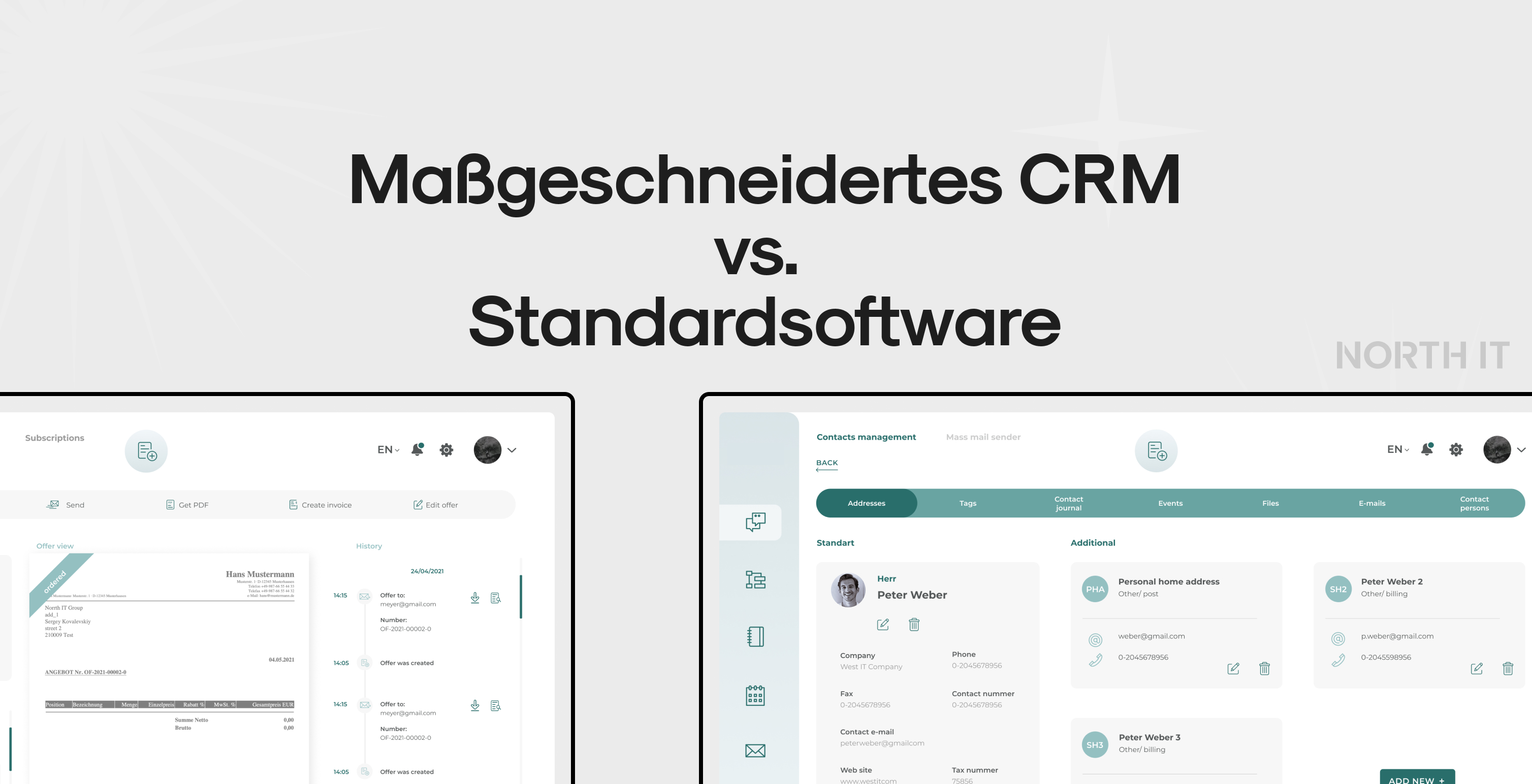A CRM system (Customer Relationship Management) is essential for efficiently managing customer relationships and optimizing business processes. However, companies often face a critical choice: custom CRM or standard software? This article explores the pros and cons of both approaches to help you make the best decision for your business.
Key Points:
- Custom CRMs offer flexibility and control but tend to be more expensive.
- Standard software is cost-effective and quick to implement but offers limited customization.
- Scalability and adaptability are vital advantages for growing businesses.
- A thorough budget and needs analysis aids decision-making.
Introduction: CRM Systems as a Key to Business Optimization
A CRM system is crucial for streamlining business processes and efficiently managing customer relationships. Whether to choose a custom CRM or standard software significantly impacts your business’s success.
What Is a Custom CRM? An Overview
A custom CRM is specifically tailored to the unique needs and workflows of a business. It offers full control, flexibility, and the ability to integrate unique features that support your business goals. Custom solutions are ideal if you want to develop an individual CRM.
What Does Standard Software Offer? A Cost-Effective Solution
Standard CRM software such as Salesforce, HubSpot, or Zoho CRM is an off-the-shelf solution designed for broad applications. These products are ideal for businesses seeking quick implementation and instant access to proven CRM functionalities without requiring extensive customization. Standard solutions are often more affordable upfront since they operate on a subscription model and do not incur high development costs. They cover a wide range of features for general business needs, including contact management, sales pipeline monitoring, and marketing automation.
For businesses with simple requirements and a preference for a quick start, standard software is an attractive option. Additionally, it often integrates with popular business applications, simplifying implementation and reducing operational costs.
Customization and Scalability: The Competitive Edge of a Custom CRM
A custom CRM allows you to align the system precisely with your workflows and business goals. Growing businesses particularly benefit from the scalability and ability to add new features as needed. By choosing to **program a CRM**, you ensure a solution tailored to your exact requirements.
Cost Factor: Comparing Both Options
While standard software often has lower initial costs, a custom CRM may be more cost-efficient in the long run, as it avoids unnecessary features and reduces recurring licensing costs. A detailed budget analysis is critical for making the right choice.
Implementation Time: Quick Start vs. Long-Term Planning
Standard CRM systems can often be up and running within days or weeks. In contrast, developing a custom CRM takes longer but delivers a tailored product that aligns perfectly with your business strategy.
User-Friendliness: How Important Is Personalization?
An intuitive user interface can make all the difference. Custom CRMs provide user-centric design to simplify daily operations. Standard software, on the other hand, may feel less intuitive due to its general-purpose nature.
Data Integration: Which Solution Fits Your Current System?
Seamless integration with existing tools and data is crucial. Custom systems can be perfectly aligned with your current technology stack, whereas standard software often offers limited integration options.
Security and Privacy: Custom Solutions Offer More Control
A custom CRM allows businesses to implement specific security measures and maintain full control over their data. Standard solutions often rely on external providers, which can introduce risks.
Long-Term Maintenance and Support: What Is More Sustainable?
Custom systems require specialized IT support but offer the freedom to make adjustments anytime. Standard software provides centralized support but has limitations in addressing unique requirements.
Decision-Making: Choosing the Right Option for Your Business
The choice between a custom CRM and a standard solution depends on several factors. Start by analyzing your specific business needs. What processes need optimization? Are there essential features that standard solutions cannot provide? A custom CRM may be the right choice if your business has unique requirements. Additionally, if you are considering having a website developed, custom solutions can be better aligned with your business processes.
The development of the CRM also plays a crucial role. Custom solutions often provide greater flexibility and scalability to grow with your business. Companies with limited budgets may benefit from the lower upfront costs of standard software but should carefully evaluate the long-term cost structure, including licensing and integration expenses.
Another important aspect is implementation time. If your business needs to be operational quickly, a standard solution might be the better choice. For comprehensive decision-making, external consultation can be invaluable. North IT Group supports companies in analyzing their requirements, whether it’s for the development of a CRM or creating a custom website, and helps you find the best strategy for your digital needs.
Conclusion: Custom CRM or Standard Software? We Help You Choose
The decision between a custom individual CRM and standard software is critical to your business’s success. Both options have unique advantages and challenges, and the right choice depends on your company’s specific needs, goals, and resources. A custom CRM offers the flexibility to align your business processes and adapt over time. It’s particularly valuable when standard solutions fall short of meeting your requirements.
North IT Group is here to analyze your needs in detail and program a CRM that fits your business perfectly. Our experts guide you through the pros and cons of each approach, helping you make an informed decision. Contact us to learn more about your custom CRM solution and how we can help optimize your business processes.
Comparison Table
| Criterion | Custom CRM | Standard Software |
|---|---|---|
| Customization | High | Limited |
| Cost | Higher but more cost-efficient long-term | Lower upfront cost |
| Implementation Time | Longer but tailored | Quick |
| User-Friendliness | Custom-designed | Universal |
| Data Integration | Seamless | Limited |
| Security | High, company-controlled | Provider-dependent |
| Support | Specialized | Centralized |
Image source: North IT Group



